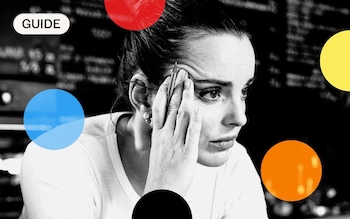The weather might be taking a turn for the better but we hay fever sufferers are unlikely to be feeling the benefit. And it’s not just itching eyes and streaming noses: picking the right medication can be a minefield. Swallowing the wrong stuff could result in a driving ban, or even worse.
The number of us suffering from allergic rhinitis – commonly known as hay fever – has rocketed over the past few years. Research by Allergy UK says nearly half of the UK’s population (49 per cent) now has some form of hay fever. And it claims a quarter (26 per cent) of UK adults regularly suffer from the condition.
One way round it for many of us is over-the-counter medicine. But might your go-to product make you as dangerous as a drunk driver? We investigate.
Why does hay fever medication make you drowsy?
Hay fever is when our body reacts to pollen from flowers, trees and grasses as if it’s harmful. To protect itself, the body produces histamine, chemicals designed to remove anything the body thinks is attacking it. The result is streaming and itching eyes, running noses plus coughing and sneezing: all symptoms of hay fever.
Antihistamine medication stops histamine production to alleviate hay fever symptoms. But there are two antihistamine types: first generation – the drowsy ones – and non-drowsy second generation.
Live Science explains: “First-generation antihistamines don’t discriminate between which histamine receptors they block. They can cross the blood-brain barrier and inhibit one of the other functions of histamines — that is, the pivotal role they play in regulating sleep and wakefulness. This disruption of the action of histamines in the brain results in drowsiness.”
Hay fever cures to use – and ones not to choose
Dr Glennis Scadding from the Royal National Throat Nose and Ear Hospital in London said: “There are perfectly good antihistamines available over the counter at pharmacists. But the thing to avoid is taking a sedating antihistamine. If you do that, you may be sleepy and your driving ability may be impaired.”
Those first-generation cures for drivers to avoid include chlorphenamine (found in Piriton, Hayleve and Boots Allergy Relieve), hydroxyzine (Atarax) and promethazine (Avomine or Sominex). These can all cause drowsiness.
The second-generation antihistamines don’t cross the blood-brain barrier so are less likely to make you sleepy if you take them in the correct quantities. The main types are cetirizine (usually branded Piriteze), loratadine (branded Clarityn) and Acrivastine in Benadryl Allergy Relief.
But medical professionals say different drugs have different effects on different people. And the NHS warned: “Fexofenadine (in Allevia and Telfast) is classed as a non-drowsy antihistamine, but some people still find it makes them feel quite sleepy.”
Why is hay fever and driving such a problem?
Road safety charity Brake says driving while drowsy can be as dangerous as drink-driving. Sneezing while driving is perilous, too. When we sneeze, our eyes are forced shut; try to sneeze with your eyes open and you’ll fail every time.
Assuming a sneeze takes one second, at 30mph we’ll travel 45ft (13.7m) with our eyes closed. At 70mph, we’ll travel 105 feet (32m). That’s around seven car lengths, effectively driving blind.
How many crashes have drivers on hay fever medication had?
Currently there are no statistics around the number of collisions involving drivers made drowsy by hay fever medication. Establishing this would involve police cross-referencing all accident victims with their medical records, which doesn’t happen.
But Dr Ashleigh Filtness, professor of human transport factors at Loughborough University, told us: “We believe about 20 per cent of collisions are caused by drowsy drivers.
“If you are driving when you’re drowsy, you will have problems such as slower reactions, you’ll be more easily distracted and have trouble with decision making, which will have an impact on doing things like navigating.”
Why driving drowsily could lead to a ban
It’s against the law to drive with legal drugs in your system if it impairs your driving. If you get caught, you could be convicted of drug driving. This will result in a minimum one-year ban, an unlimited fine, up to six months in prison and a criminal record. The maximum penalty for causing death by dangerous driving while under the influence of drugs is life in prison.
The conviction will stay on your driving licence for 11 years, meaning the lengthy hangover of more expensive insurance.
What can you do about it?
First, recognise if you’re feeling drowsy. Dr Filtness advised: “People need to be aware of how sleepy they are. If you’re having to open the window or turn the radio up while driving because you know you’re tired, you should get off the road. You can’t overcome sleepiness.
“A lot of hay fever medication is taken once a day. For most people, I’d suggest they take their medication when they get home in the evening so the body has plenty of time to process it before they drive again.”
Medication aside, there are plenty of other steps you can take. When you’re not driving, turn your car’s ventilation fan up to maximum and give the vents a good blast to dislodge dust in them. Then vacuum the seats, mats and carpets to get rid of any pollen lurking in the car.

Charity IAM Roadsmart’s head of driving and riding standards, Richard Ladyman, said: “Keeping your windows closed and setting your air-conditioning to recycle will reduce pollen concentrations in your vehicle.
“Put a few dabs of Vaseline inside your nostrils to help catch pollen. And if your nose is running, keep tissues to hand in the car.
“If you do think you’re going to sneeze, slow down or drop back from the vehicle in front. If you can do it safely, stop. If you tend to have sneezing fits, we recommend finding an appropriate place to stop and allow yourself to recover.
“Remember, if you’re struggling to see and sneezing too, you won’t be safe on the road.” And that could be costly to all of us in various ways.
Disclaimer: The copyright of this article belongs to the original author. Reposting this article is solely for the purpose of information dissemination and does not constitute any investment advice. If there is any infringement, please contact us immediately. We will make corrections or deletions as necessary. Thank you.



